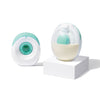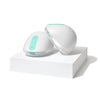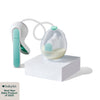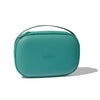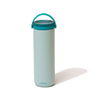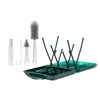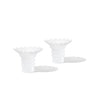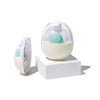Medication and Breastfeeding: What’s Safe, What to Avoid, and How to Stay Healthy
Everything you need to know about managing a cold while pumping or nursing your baby.
Whether you’re dealing with your first cold of the fall and winter season or just battling the daily germs that your baby brings home from daycare, you might be wondering which medications are safe to take if you’re still breastfeeding your baby.
While it’s true that cold medications can pass through your bloodstream and into your breast milk (this is true of any drug!), this doesn’t necessarily mean that they’re off limits! Below, we’ll walk through.
Quick Reference: Safe vs. Caution Cold Medications
|
Medication |
Safe While Breastfeeding? |
Notes |
|
Acetaminophen (Tylenol) |
Yes ✅ |
Reduces pain and fever |
|
Ibuprofen (Advil, Motrin) |
Yes ✅ |
Safe for inflammation and fever |
|
Loratadine, Cetirizine |
Yes ✅ |
Non-drowsy antihistamines |
|
Fexofenadine (Allegra) |
Yes ✅ |
Safe but less studied |
|
Diphenhydramine (Benadryl) |
Use with caution ⚠️ |
May cause drowsiness, reduce supply |
|
Decongestants (Sudafed) |
Use with caution ⚠️ |
May lower milk supply |
|
Dextromethorphan (Robitussin) |
Yes ✅ |
Safe in low doses |
|
Naproxen (Aleve) |
Short-term only ⚠️ |
Avoid long-term use |
|
Aspirin |
Avoid ❌ |
Risk of Reye’s syndrome |
|
Codeine, Oxycodone, Tramadol |
Avoid ❌ |
May cause infant drowsiness or breathing issues |
General Guidelines for Taking Medication While Breastfeeding
According to the CDC, most medications pass into breast milk in small amounts — usually less than 10% of the maternal dose. In most cases, these trace amounts don’t affect your baby or milk supply. However, some drugs (like decongestants) can temporarily reduce milk production, so it’s best to check with your doctor before taking any new medication.
That being said, you should always talk to your OBGYN, pediatrician, or other healthcare provider before taking anything that you’re unsure about.
Safe Cold Medicines While Breastfeeding
Acetaminophen (Tylenol)
A go-to for pain, fever, and body aches, acetaminophen is one of the safest cold medications for breastfeeding mothers. Studies show that less than 1% of the dose passes into breast milk, making it safe for both you and your baby.
While breastfeeding, note that you should not exceed a dosage of 4,000 mg per day. Anything more than that may pose the risk of damage to your liver. Additionally, you’ll want to limit alcohol consumption while taking acetaminophen — something you’re probably doing anyway if you’re pumping or nursing.
Ibuprofen
Another safe choice for fever, inflammation, and postpartum aches, ibuprofen has a short half-life and minimal milk transfer. It’s one of the most recommended pain relievers for nursing moms.
If you’re dealing with serious pain or discomfort, you might consider alternating between Tylenol and Motrin or Advil every three to four hours. Otherwise, you should wait the recommended duration of six hours before taking another dose of the same medication. (In other words, you should only take a dose of Motrin or Advil every six hours, and the same goes for a dose of Tylenol.)
Antihistamines (Loratadine, Cetirizine)
For allergy or cold-related congestion, non-drowsy antihistamines like loratadine (Claritin) or cetirizine (Zyrtec) are safe while breastfeeding. They help relieve sneezing, itching, and watery eyes without significantly affecting milk production.
The issue with antihistamines is that when taken in large doses, they post a risk of drowsiness or sedation in babies. This can lead to difficulty feeding, especially in the early days when feeding often and gaining weight is critical.
Other Allergy and Cold Relief Medications
-
Fexofenadine (Allegra): Considered safe, but less researched than loratadine or cetirizine.
-
Diphenhydramine (Benadryl): Can cause drowsiness in both you and your baby; best used sparingly, usually at bedtime.
- Guaifenesin (Mucinex): Common expectorant for chest congestion; limited research, but short-term use is generally considered low-risk.
Painkillers and Postpartum Medications to Use Carefully
Some pain medications are riskier during breastfeeding due to stronger effects or higher transfer rates to breast milk.
-
Naproxen (Aleve): Acceptable for short-term use but should be avoided for long periods due to its longer half-life.
-
Aspirin: Not recommended. It may cause Reye’s syndrome in infants and interfere with your baby’s blood clotting.
-
Codeine, Oxycodone, Tramadol: Avoid unless prescribed specifically for you. These opioids can cause serious side effects such as sedation or breathing issues in infants.
If you need stronger pain relief, talk to your healthcare provider about alternatives that are proven safe for breastfeeding mothers.
Antibiotics and Infections During Breastfeeding
If your cold turns into a bacterial infection, your doctor may prescribe antibiotics. Most are safe while breastfeeding and won’t affect your baby.
Safe antibiotic options include:
- Amoxicillin and penicillin
- Cephalexin (Keflex)
- Azithromycin (Zithromax)
-
Clarithromycin
Antibiotics that require caution include:
-
Doxycycline and ciprofloxacin (generally safe short-term but can affect your baby’s gut flora)
If you’re prescribed antibiotics, finish the full course and watch for temporary digestive changes in your baby, such as mild gas or loose stools.
Digestive and Nausea Medications
It’s common to experience mild digestive discomfort while you’re sick or taking antibiotics. These are generally safe options:
- Antacids (Tums, Maalox): Safe and non-absorbable.
- Loperamide (Imodium): Minimal milk transfer; safe in small doses.
- Bismuth subsalicylate (Pepto-Bismol): Avoid while breastfeeding due to its aspirin-like ingredient (salicylate).
- Ondansetron (Zofran): Commonly used for nausea; research is limited but generally considered safe with medical guidance.
Vitamins, Supplements, and Immune Support
When you’re sick, it’s tempting to reach for supplements and herbal remedies to boost your immune system — but not all are safe during breastfeeding.
Safe options:
-
Vitamin C and Vitamin D: Safe in recommended doses; can support immunity and recovery.
-
Zinc: Safe when taken as directed and often found in lozenges or multivitamins.
Use with caution:
- Echinacea: Limited evidence; may cause allergic reactions in some individuals.
- Ginseng and Sage: May reduce milk production.
-
Elderberry: Popular for immune support, but not well studied in breastfeeding.
Always speak to your healthcare provider before starting any supplement or herbal product, especially if it claims to boost milk or immunity.
Natural Remedies for Cold Relief
If you prefer a gentler approach, natural remedies can be highly effective alongside rest and hydration.
- Hydration and Rest: Drink plenty of water, herbal teas, and broths to loosen mucus and maintain milk flow. Try to sleep when your baby sleeps — your body heals best during rest.
- Saline Nasal Sprays and Steam: Saline rinses or humidifiers can relieve nasal pressure without the need for decongestants. Steam inhalation helps loosen mucus naturally and soothe irritated sinuses.
- Honey and Lemon: Honey is a natural cough suppressant that coats the throat and reduces irritation. Mix it with lemon and warm water for a soothing drink. (Remember: Never give honey to babies under 12 months.)
Managing Cold Symptoms Safely While Breastfeeding
Recovering from a cold while nursing can be challenging, but with the right care, you’ll feel better in no time.
- Focus on rest, hydration, and nutrient-rich foods.
- Continue breastfeeding — your milk provides antibodies that help protect your baby.
- Don’t skip medications out of fear — most are safe in moderation.
- Monitor your baby for any unusual reactions.
If you’re unsure about a specific medicine or supplement, reach out to your doctor or a lactation consultant before taking it.
For more articles on maintaining your health and wellbeing while breastfeeding, check out our blog and YouTube channel for expert-backed guidance.
FAQs:
-
Can I take Tylenol while breastfeeding?
Yes. Tylenol (acetaminophen) is one of the safest medications for breastfeeding mothers when used as directed. -
Can I take DayQuil or NyQuil while breastfeeding?
Use with caution. These contain multiple ingredients that can affect milk supply or cause drowsiness. Always check labels and consult your doctor. -
What cold medicine is safest while breastfeeding?
Acetaminophen, ibuprofen, and non-drowsy antihistamines like loratadine or cetirizine are safest choices. -
Are natural remedies safe for cold relief while breastfeeding?
Yes. Steam, saline rinses, honey, rest, and hydration are gentle and effective options. -
What should I do if my baby reacts to my medication?
If your baby seems unusually sleepy, irritable, or has feeding difficulties, contact your pediatrician right away.
Medical Disclaimer
This article was medically reviewed by Stacey Zimmels, Speech and Language Therapist (SLT) and International Board-Certified Lactation Consultant (IBCLC). It is intended for informational purposes only and does not replace medical advice. Always consult your healthcare provider before taking any medication while breastfeeding.
Focus on Your Recovery, Not Your Pumping Setup
When you're battling a cold, the last thing you want to do is be stuck on the couch connected to a pump. Your rest is a crucial part of getting better and protecting your milk supply.
The Willow Go™ Wearable Breast Pump is designed for moments like these. Its compact, all-in-one design fits right in your bra, giving you the freedom to hydrate, use a saline spray, or simply rest and recover while you pump.
With the Willow Go, you can:
- Pump Comfortably While You Rest: Find a comfortable position on the couch or in bed without being tied down.
- Stay Hydrated with Ease: Get the water and tea you need without interrupting your pumping session.
- Maintain Your Supply: Keep to your pumping schedule effortlessly, even when you're under the weather.
Ready to make your pumping journey easier, especially on sick days?
For more guidance on maintaining your milk supply and comfort while breastfeeding and pumping, explore our Willow Blog for expert-backed advice.
Tags Used
